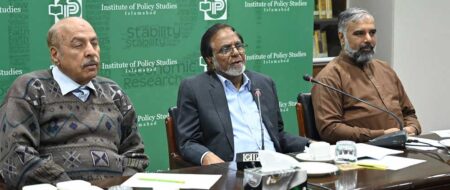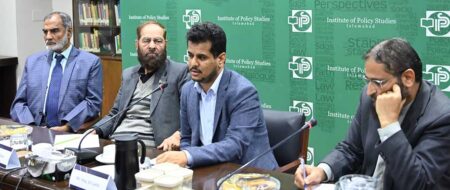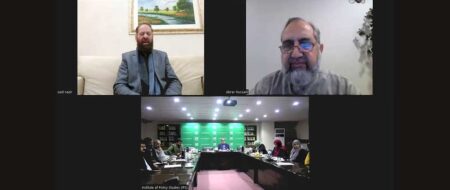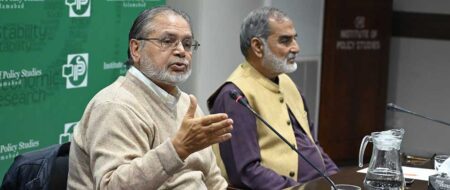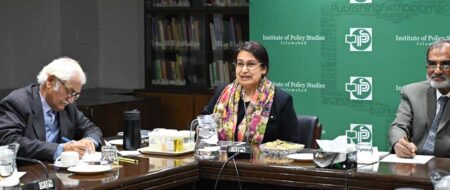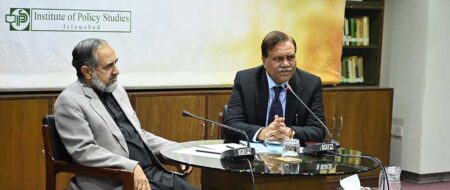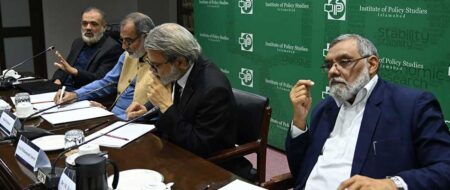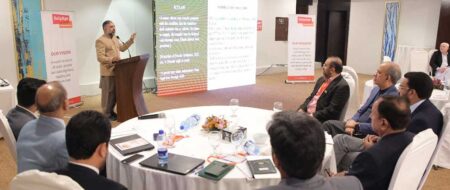‘Afghan Refugee Situation in Pakistan: Prospects of Integration vs Repatriation’
Pakistan should consider returning Afghan refugees as key human capital and should repatriate them positively as a political investment to improve bilateral relations. The need is to devise a political solution and a proper mechanism based on certain push and pull factors, efficient legislation, authentic data, and a detailed research.
To brainstorm the prospects and implications of repatriation and integration of Afghan refugees and their status in Pakistan, the Institute of Policy Studies (IPS) held an in-house brainstorming session with Noorulain Naseem, research analyst, IPS research associate, and fellow at the Stimson Center, on April 20, 2022.
The session was held to explore the thematic interest and scope of the research study to be conducted by Noorulain Naseem under the auspices of IPS. The session was joined by Khalid Rahman, chairman IPS, Ambassador Syed Abrar Hussain, vice-chairman IPS, Naufil Shahrukh, GM Operations IPS, and IPS in-house research team.
While presenting her research ideas, Noorulain highlighted certain factors as the base of her study that contribute to the desuetude of repatriation and integration potential that Pakistan holds. These factors include the research and information loophole of Pakistan, legislative and administrative passivity of Pakistan, and the volatility of Afghanistan.
The research and information loophole implies the lack of accurate, authentic, and regularly updated data on nature, frequency, the preferred destination of migrants, and other relevant aspects about refugees who number 2.5 million in Pakistan. Out of these, only 1.4 million are registered under the UN data with very little information. Thus, there is a clear dispute regarding data on Afghan refugees between the government of Pakistan and the UN institutions on various fronts.
This loophole paves the way for exploitation by international media to demonize and malign Pakistan. At a time when refugees all across the globe are being treated discriminately and harshly, Pakistan is the country where they are welcomed with open arms. With this scenario on the ground, Pakistan should counter the false portrayal by international media by communicating the factual data and filling the information, data, policy, and research gaps.
The legislative and administrative passivity of Pakistan refers to governance issues in managing, repatriating, and integrating Afghan refugees. A key issue, as discussed by the speaker, is the absence of a concrete definition of refugees in Pakistan’s legislation. Without such a definition, there could be no effective and efficient law or solution for the repatriation and integration of Afghan refugees.
As Pakistan has no state-level law about refugees, the relevant cases are dealt with through the 1951 Refugee Convention, along with its Protocol 1967, the key international legal document relating to refugees’ protection and status and to which Pakistan is not a signatory. The main body working for refugees in Pakistan is an international agency, UNHCR, which has its own mandate regarding refugees, their rights, and duties. Fifty-three percent of donations under UNHCR 2022 funding commitment of $129 million is provided by the US, while only 58% of it is available. This demonstrates the government’s negligence in this spectrum and has created a shift of responsibilities and a lack of ownership in Pakistan’s institutions.
Because there is no legal definition of refugees, Pakistan uses the term ‘externally displaced people’ for Afghan and other refugees in official documents. As there are certain rights and responsibilities attached to the term ‘refugee’, the term ‘externally displaced people’ is devoid of them. This is another loophole that hinders the fulfillment of the said potential.
Another concern is the securitization of the refugee situation, as it is indicated as a security goal in the National Action Plan of Pakistan in its 19th point. This transforms the refugee issue from being a political one to a security one. This might be damaging in the long run as one can vividly observe that this protracted refugee situation in Pakistan is because of the political passivity to forge a solution through effective legislation, administration, and implementation.
Moreover, this protracted situation is again being intensified by Pakistan as it is continuously delaying repatriation since 2009 by updating the agreement with UNHCR regarding the extension of refugee stay in Pakistan.
Lastly, the volatility of Afghanistan refers to the unpredictable political and economic situation of the country, which has been unstable since the Taliban takeover. This has resulted in 700,000 displaced people and 18 million people in need of humanitarian assistance. The volatility could result in more refugee influx in Pakistan, along with reducing the repatriation potential of 2.5 million Afghan refugees still hosted by Pakistan.
According to the speaker, as possible deliverables, Pakistan should review the governmental, INGO, and communal level mechanisms and investment in Afghan refugee management to measure the actual cost of hosting refugees in Pakistan.
In addition, Pakistan should consider them as key human capital and should repatriate them positively as an investment to improve bilateral relations. Moreover, Pakistan should create push factors and propose policy options to relevant authorities to manage, repatriate, and integrate refugees.
Noorulain also pointed out the need to research and analyze various dimensions of the phenomenon. For instance, research is needed on the current level of refugees’ mobility, demographic mix, and displacement causes; how their registration, camping, and integration are being managed; the reasons why Pakistan is not being able to repatriate refugees; the possible push factors towards repatriation; legislative delays and gaps; the link established between Afghan refugees and security issues; etc.
Abrar Hussain highlighted the need to quest the issue of around one million Afghan refugees who are unregistered and the reason behind the absence of data. He spoke about the issue of Afghan refugees acquiring Pakistani ID cards to avoid repatriation. He also endorsed the speaker’s notion about considering refugees as key human capital and creating proper mechanisms for this. Furthermore, while adding to the speaker’s idea of creating push factors in Pakistan, he maintained that there should also be certain pull factors in Afghanistan to facilitate repatriation and integration.
In his remarks, Khalid Rahman conveyed the incentive of this research association to serve a larger purpose. According to him, certain aspects should be kept in mind while conducting the research and analyzing the findings. These include the interest and actions of the US government for repatriation and integration of Afghan refugees back into Afghanistan; the reason for Pakistan not signing the 1951 Refugee Convention; the ongoing scenario in Afghanistan and its implications in the form of refugee influx in Pakistan; the implication of pull factors; the problematic and causal core of the absence of any legal definition of refugee, lack of data transparency, legislative passivity, and governance negligence; and, the long history of Pak-Afghan relations affecting the refugee situation in different dimensions.




